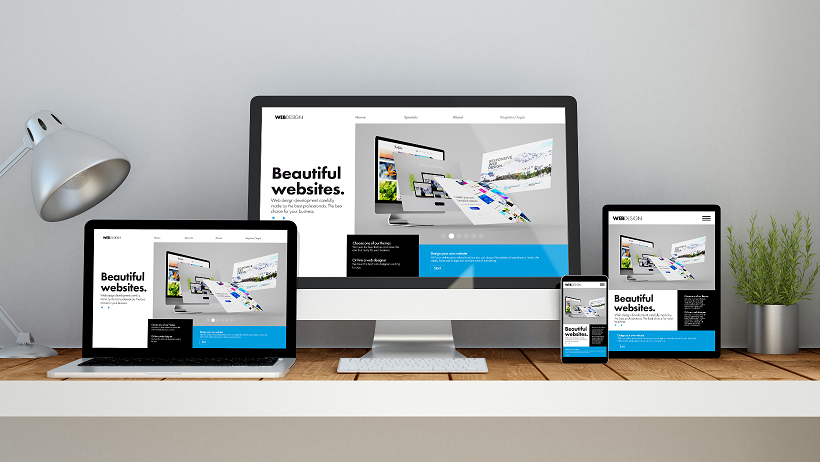
"The Importance of Responsive Website Design: Ensuring a Seamless User Experience Across Devices"
In the rapidly evolving digital age, where online interactions unfold across a myriad of devices, the paramount significance of responsive website design cannot be overstated. Moreover, responsive design ensures that websites seamlessly adapt to various screen sizes and devices, thereby delivering users not only a consistent and enjoyable browsing experience but also fostering engagement. In this comprehensive article, we will delve into the key facets of responsive web design and elucidate precisely why it is pivotal for the triumph of any online presence.
1. Mobile Usage Trends:
The proliferation of smartphones and tablets has profoundly altered how people access the internet. Given the substantial portion of web traffic originating from mobile devices, businesses must prioritize responsive design to adeptly cater to the dynamic needs of their mobile audience. Furthermore, this approach ensures that the website is not only visually appealing but also functions seamlessly on a plethora of devices.
2. Enhanced User Experience:
Responsive websites dynamically adjust their layout and content to fit the screen size of the device in use. This adaptability results in a seamless and user-friendly experience, significantly diminishing the need for zooming or horizontal scrolling. Consequently, a positive user experience becomes imperative for retaining visitors and encouraging them to delve deeper into the content, ultimately enhancing user satisfaction.
3. SEO Benefits:
Search engines, notably Google, accord precedence to mobile-friendly websites in their rankings. Responsive design contributes to improved SEO performance by consolidating all website content into a single URL. This strategic consolidation mitigates issues such as duplicate content, ensuring that search engines can effortlessly crawl, index, and rank the site effectively.
4. Cost-Effective Solution:
Maintaining a separate mobile version of a website can be both time-consuming and costly. Responsive design streamlines the development and maintenance process, enabling businesses to allocate resources more efficiently. This streamlined approach not only saves time and resources but also eliminates the need for multiple SEO campaigns, as there is only one set of URLs to optimize.
5. Adaptability to Future Devices:
As technology progresses, novel devices with diverse screen sizes and resolutions emerge. Responsive design is inherently future-proof, ensuring that your website will continue to deliver an optimal user experience on devices that haven’t even been conceived yet. This adaptability prepares businesses for the ever-evolving technological landscape, demonstrating foresight and a commitment to long-term user satisfaction.
6. Increased Conversion Rates:
A responsive website holds the potential to elevate conversion rates significantly. When users can effortlessly navigate and interact with a site, they are more inclined to engage with its content and accomplish desired actions, such as making a purchase or filling out a contact form. This streamlined interaction not only boosts conversion rates but also contributes to a positive online reputation.
7. Social Media Friendliness:
Given the prevalence of social media sharing on mobile devices, having a responsive website is pivotal for maximizing the impact of social media marketing efforts. Responsive design ensures that shared links lead to a user-friendly experience, irrespective of the device used to access them. This seamless integration with social media platforms enhances the reach and effectiveness of a business’s online presence.
8. Loading Speed Optimization:
Mobile users are often on-the-go and anticipate swift access to information. Responsive design often involves optimizing images and other elements for quicker loading times, contributing to an enhanced overall user experience and reducing bounce rates. This commitment to loading speed optimization not only improves user satisfaction but also positively influences search engine rankings.
9. Competitive Edge:
In a fiercely competitive online landscape, having a responsive website is no longer discretionary but an absolute necessity. Businesses that invest in responsive design gain a competitive edge by providing a superior user experience and meeting the expectations of modern internet users. This strategic advantage translates into increased brand loyalty, higher customer retention, and a stronger market position.
10. Conclusion:
In conclusion, responsive website design is a foundational aspect of building a successful online presence. It not only caters to the exigencies of the current digital landscape but also ensures adaptability to the ever-evolving world of technology. By prioritizing responsive design, businesses can augment user satisfaction, enhance SEO performance, and stay ahead of the curve in an increasingly mobile-centric digital environment.
To avail of our services, kindly follow the links below:
